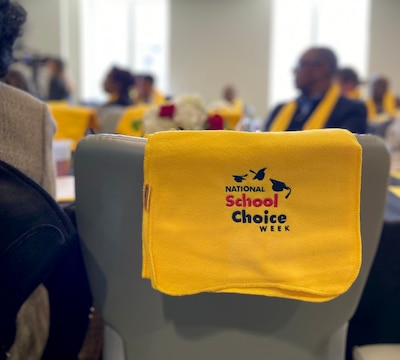Sign up for Chalkbeat Tennessee’s free daily newsletter to keep up with Memphis-Shelby County Schools and statewide education policy.
After failing to reach contract terms with its first choice to run its growing private school voucher program, Tennessee has turned to a young Indiana company with a small staff, modest cash flow, and no state-level experience managing education savings accounts.
The state education department signed a $3.675 million, five-year contract in May with Student First Technologies to help run the voucher program, bypassing Florida-based ClassWallet, whose proposal ranked first in the state’s bidding process.
Officials for the state and its new vendor say they’re on track to take all of their new electronic platforms live by January to automate the application and payment processes for education savings accounts. The voucher-like program lets eligible families receive taxpayer funding to send their children to private schools.
But Tennessee’s selection of 6-year-old Student First Technologies has raised eyebrows within the industry. The company faces a tight timeline to stand up new systems that need to work well enough to build public trust in the controversial program, which launched last fall in Shelby and Davidson counties and expands to Hamilton County this school year.
Gov. Bill Lee, who spent considerable political capital convincing the legislature to approve a voucher program, has a big stake in a smooth rollout. It’s no secret the Republican governor wants to expand voucher eligibility beyond Memphis, Nashville, and Chattanooga.
“Gov. Lee doesn’t need any more controversy or negative headlines about education savings accounts if he wants to grow this beyond a few urban counties,” said Kent Syler, a political science professor at Middle Tennessee State University.
Help wanted: New technology to support growing voucher programs
In January, Tennessee invited companies to submit proposals to manage its education savings accounts, as well as its individualized education account program for students with autism, developmental delays, and other disabilities.
Both programs have been overseen so far by a small team of employees at the state education department who review applications, confirm enrollment with private schools, pre-approve funds, and then disburse and monitor those funds.
“There’s a lot of work that we do by hand,” said Nate Parker, who was the state’s school choice administrator, during a presentation last October to the State Board of Education.
But the number of voucher users is projected to grow significantly beyond last school year’s enrollment of about 700 students with ESAs and 338 students in the IEA program. As of Aug. 4, the number of ESA participants enrolled in participating private schools for 2023-24 had more than doubled.
Shifting the management of both programs to automated platforms will be “transformational” in terms of efficiency and growth, Parker said.
Tennessee bypasses the market leader
Chalkbeat reviewed hundreds of pages of documents from the bidding process, obtained through a public records request from the Tennessee Department of General Services, which oversaw the process.
ClassWallet eclipsed four other bidders in the state’s evaluation this March of all technical and cost proposals to run the program, as well as each company’s level of experience. It’s the market leader and currently manages ESA programs in five states: Arizona, Indiana, Missouri, New Hampshire, and North Carolina.
On a 100-point scale, ClassWallet scored more than 20 points higher than Student First. Also submitting proposals were Merit International, Odyssey, and LiftForward Inc.
ClassWallet is no stranger to Tennessee, having landed the state’s initial two-year contract to manage its voucher platforms in 2020 under a controversial no-bid process. But just months before the program was to launch, the work ground to a halt due to a legal challenge to the state’s 2019 voucher law.
Once a 2022 court order allowed the program to proceed, ClassWallet was eager to work with Tennessee again. In its latest proposal, the company trumpeted nearly a decade of experience providing education-related online platforms, a staff of hundreds of employees, significant financial capital, and the ability to activate new platforms quickly. On average, it’s taken ClassWallet 48 days to get state-level voucher programs up and running once the work begins, the company said.
But negotiations between ClassWallet and the state broke down within weeks of the state announcing its first choice.
State officials declined to give specifics about what happened, as did Jamie Rosenberg, the founder and CEO of ClassWallet.
“While ClassWallet remains disappointed by the outcome, ClassWallet respects the decision made by the Tennessee Department of Education,” Rosenberg said in a statement.

ClassWallet’s exit opened the door for a new player
Student First Technologies officially launched in 2017 to develop technology platforms for the growing number of publicly funded school choice programs.
According to the bios of the firm’s co-founders, Chief Executive Officer Mark Duran and Chief Technology Officer Forrest Fowler came from “alternative education backgrounds” that included homeschooling and learning pods, as well a mix of public and private school experiences.
Their company’s first focus: scholarship tax credits, which allow taxpayers to get full or partial tax credits when they donate to nonprofit groups giving private school scholarships to students.
Within two years, the company’s portfolio grew from two to 15 states and programs distributing over $100 million annually in family-directed education support. Then in 2019, Student First shifted its focus to education savings accounts and microgrants, and created a new online platform — dubbed Theodore — to manage them and its scholarship tax credit work.
Among the company’s biggest technology contracts is for Indiana Learns, a $20 million microgrant program providing after-school tutoring to help students in that state catch up from learning lag caused by the pandemic.
Tennessee’s program is the company’s first full-fledged entry into the education savings account arena.
“It’s a great addition to our portfolio of programs that are helping students access education opportunities,” CEO Duran said in an interview with Chalkbeat.
Student First’s platform can adapt to any type of education funding program, Duran said, adding that the company’s microgrant work is relatively similar to ESA management.
“So we’re very confident,” Duran said. “While this might be our first statewide contract for a state-administered ESA, the technical capabilities are similar.”
But concerns about the state’s choice linger based on the company’s technical proposal, which showed a total income of just over $230,000 and net income of nearly $69,000 between Dec. 1, 2022, and Feb. 28, 2023. Beyond its two founders, the proposal identified three full-time employees, as well as nine others doing freelance, consulting, or part-time work — with an eye on expansion.
“We have made offers to highly qualified professionals who have committed to joining the team upon award of this RFP,” the proposal said.
ClassWallet’s proposal, by contrast, reported that it had 244 employees, and that FACTS Management, a subcontractor, employs another 360.
Asked whether Student First has the staff, expertise, and financing to complete its tasks for Tennessee, a state spokesperson said the state’s evaluation of the company’s proposal “confirmed that the vendor meets the requirements and is able and willing to provide the services as outlined in the contract.”
And Lizzette Reynolds, Tennessee’s new education commissioner, called Student First a “great choice” based on her previous policy work at ExcelinEd, a pro-voucher advocacy group that keeps abreast of the vendor pool.
Last week, Duran said his firm has added full-time staff and continues to look for qualified developers, product managers, project managers, and other employees.
“As currently staffed, our team is very well equipped to take care of Tennessee,” he said. “But as a growing company, we’re also keeping an eye out for other people who might be a good addition.”
Duran added that the company’s organizational structure allows it to respond quickly to technical questions and any issues that may surface with Tennessee’s platforms.
“We are the only organization that has a co-founder as chief technology officer leading a U.S.-based technology development team,” he said. “This ensures that our product development and data security remain top quality.”
Vendor has a long list of deadlines to meet
Student First’s platform for Tennessee will go live in stages over the next six months, starting this month with the portal used by 75 state-approved private schools participating in the program in and around Memphis, Nashville, and Chattanooga.
Training for private school leaders began this week, while training for families with ESA accounts is to begin Sept. 1. The family portal to manage payments is scheduled to go live on Sept. 8 for students already approved to participate this school year. Providers of outside-of-school services such as tutoring and therapy are set to join the platform in mid-November. And the portal for families to apply to participate in the voucher program in 2024-25 is scheduled to open by Jan. 15.

The state’s focus, according to a statement from the education department, has been to ensure that school administrators feel confident about their platform before parents access and make payments within the system.
“Everything is on schedule,” Duran added.
As for customer relations, the contract requires Student First to handle any technology issues — from system glitches to password resets — while staff at the education department handles questions about the program. Asked how many people are on that team, a department spokesperson responded only that “all members of the ESA team are responsible for ESA oversight.”
Passing ESA laws is hard. Implementation is harder.
Rep. John Ray Clemmons, a Nashville Democrat who opposes vouchers, is not surprised that the state chose a novice vendor to run ESAs.
The entire initiative, he said, is “misguided” and erodes support and funding for public education. Oversight and accountability over student learning via state-funded ESAs are also problematic, he said, as is the potential for discrimination against students who are too troublesome or expensive to teach, or who have beliefs that conflict with the beliefs of participating private schools.
“I don’t think the goal here is to improve student outcomes, and I don’t think this governor’s administration is particularly concerned about how well the program is executed,” said Clemmons, who chairs his party’s caucus in the House. “This whole endeavor is clearly designed to steer public money to private hands.”
Robert Enlow is the president and CEO of EdChoice, which supports programs like Tennessee’s that offer taxpayer-funded choices beyond traditional public schools. He says ESAs are already becoming entrenched in the nation’s K-12 landscape. For instance, Arizona, Arkansas, Florida, Iowa, South Carolina, Utah, and West Virginia now offer ESAs for most or all of their families.

But Enlow cautions that “the devil is in the details.” There must be transparency, clarity, competence, and communication about payment options and processes, the appropriate use of ESA funds, and timely disbursements to private schools and other vendors offering private services.
“Passing strong ESA laws is hard, but implementing these programs with excellence is harder,” Enlow said. “The details of implementation have to be done well.”
Early reports of fraud in Arizona’s voucher program or delayed IEA payments in Tennessee haven’t helped to build trust with either the public or providers. And the logistics of managing ESAs can be daunting, including determining which educational expenses are allowable, as states put purchasing power directly in the hands of families.
At the same time, Enlow points out that the vendor pool for automating ESA services is young compared with, say, companies that manage third-party payments for large government programs such as Medicaid.
“It’s pretty early, which is another reason why we should be patient,” Enlow said. “These things do take time.”
Marta Aldrich is a senior correspondent and covers the statehouse for Chalkbeat Tennessee. Contact her at maldrich@chalkbeat.org.





